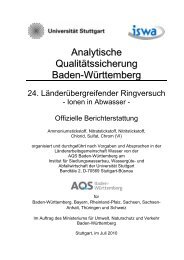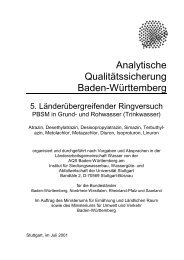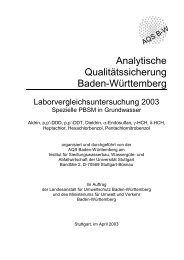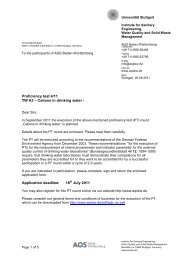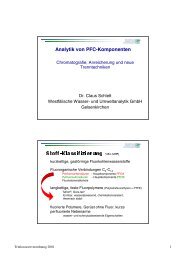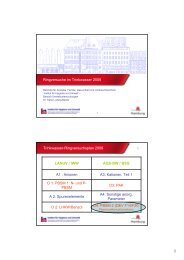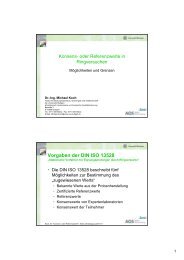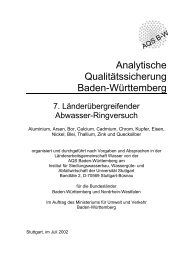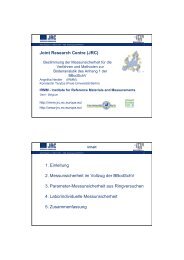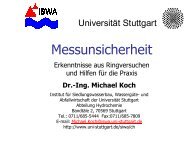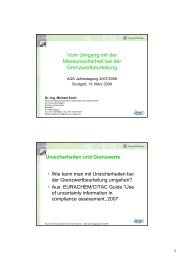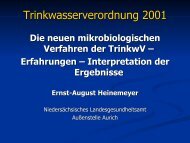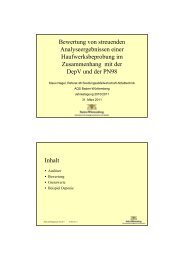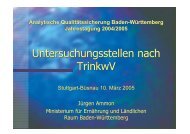Institute for Sanitary Engineering, Water Quality and Solid Waste ...
Institute for Sanitary Engineering, Water Quality and Solid Waste ...
Institute for Sanitary Engineering, Water Quality and Solid Waste ...
Create successful ePaper yourself
Turn your PDF publications into a flip-book with our unique Google optimized e-Paper software.
<strong>Waste</strong> <strong>Water</strong> Technology AWT<br />
A 2-stage concept <strong>for</strong> fermentative hydrogen <strong>and</strong><br />
biogas production by means of an innovative gas<br />
treatment<br />
Worldwide, the energy dem<strong>and</strong> is still predominantly<br />
supplied from fossil fuels. Increasing energy consumption,<br />
limited natural resources <strong>and</strong> global warming, as<br />
a result of the excessive CO 2 emissions connected with<br />
the burning of fossil fuels, require the development of<br />
alternative methods <strong>for</strong> energy production. Fuel cells<br />
that use hydrogen as a fuel are a promising alternative<br />
<strong>for</strong> energy production. However, current methods <strong>for</strong><br />
hydrogen production are still quite energy-consuming.<br />
For this reason, biological production of hydrogen is<br />
investigated as a possible alternative.<br />
Aim of the project is the production of bio-hydrogen<br />
<strong>and</strong> biogas by means of an innovative technique <strong>for</strong><br />
gas separation (IFK). The process should be carried<br />
out in a two-stage anaerobic fermentation process. As<br />
an alternative, bio-polymers instead of biogas could<br />
be produced. At the first stage the substrate originating<br />
from biological wastewater treatment processes is<br />
trans<strong>for</strong>med by incomplete fermentation to hydrogen.<br />
The end-products of the first incomplete fermentation<br />
can be further fermented at a second stage to produce<br />
biogas or biopolymers. The produced gas of both<br />
stages is treated by means of special ion-exchangers,<br />
which separate CO 2 from the corresponding gas mixture,<br />
at ambient pressure. The upgraded pure hydrogen<br />
can be used as fuel in public traffic while the pure<br />
biogas can be injected into the biogas network. During<br />
the gas-separation process heat is emitted, which<br />
can be utilized <strong>for</strong> the heating of the fermenters <strong>and</strong><br />
contribute to the self-sufficiency of the whole process.<br />
The production of almost pure CO 2 during the regeneration<br />
process of the ion-exchangers is another advantage.<br />
This CO 2 can be returned into the reactor of<br />
the first stage <strong>for</strong> the reduction of the partial pressure<br />
of hydrogen down to equilibrium concentrations (10 -3<br />
bar – 10 -4 bar) <strong>for</strong> the improvement of the hydrogen<br />
yield.<br />
Within the scope of lab-scale experiments, various<br />
substrates originating from wastewater treatment will<br />
be tested <strong>for</strong> their suitability <strong>for</strong> bio-hydrogen production<br />
<strong>and</strong> their corresponding end-products <strong>for</strong> biogas<br />
<strong>and</strong> biopolymer production. Herewith, the influence of<br />
the boundary conditions (e.g. pH, partial pressure of<br />
hydrogen, required CO 2 quantities <strong>for</strong> stripping, nutrients,<br />
solids retention time, loading of the fermenters,<br />
substrate composition) on these biological processes<br />
should be investigated. The major aim is the maximisation<br />
of the yields of each process.<br />
Funding:<br />
Bundesministerium für Bildung und Forschung<br />
(BMBF)<br />
Funding Duration:<br />
03/2009 - 02/2012<br />
Project Partner:<br />
Institut für Feuerungs- und Kraftwerkstechnik (IFK),<br />
Universität Stuttgart<br />
EnBW AG<br />
Purolite Deutschl<strong>and</strong> GmbH<br />
RBS wave GmbH<br />
Project Manager:<br />
Prof. Dr.-Ing. H. Steinmetz<br />
Project Coordinator:<br />
Dipl.-Ing. RBM C. Meyer<br />
Contact Person:<br />
Iosif Mariakakis, M.Sc.<br />
Internet:<br />
http://www.iswa.uni-stuttgart.de/awt/en/research_<br />
current.html#hydrogen2<br />
Figure:<br />
Scheme of process<br />
23



